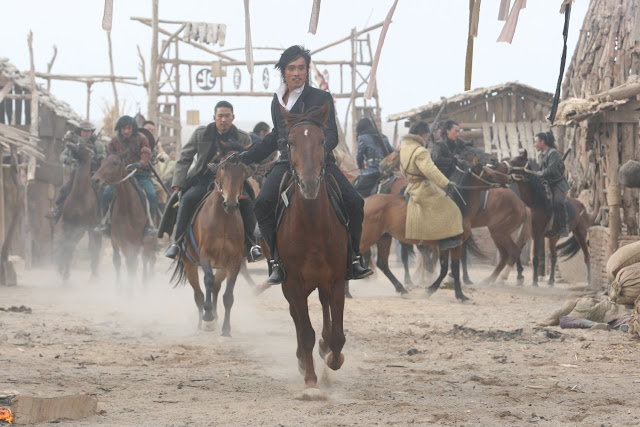Why aren't there more movies about alien abductions? It's such a classic part of North American folklore, you'd expect that bug-eyed monsters would get at least as much play in the realm of horror cinema as demonic possessions or ghost children. I feel as though it's an untapped well of potential; aside from the obvious "based on a true story" mystique, there's also the inherent fear associated with the unknown encroaching upon familiar territory. The concept of flying saucers snatching up farm animals may seem quaint by today's standards, but it shouldn't be difficult at all to make an effective horror movie involving ordinary, relatable people getting snatched from their beds by strange creatures for god knows what purpose. In hindsight, there are a decent number of movies that fit that description, so perhaps I should rephrase my original question; why aren't there more good movies about alien abductions? It seems that, if you want to watch a movie about UFOs making people disappear, you'll have to settle for mediocre trash like the aptly-titled Alien Abduction.
Taking the form of found footage (oh joy), the film follows the Morris family on their camping trip in Brown Mountain, North Carolina. The youngest member of the Morris clan, Riley (Riley Polanski), is keeping a video journal of the vacation as a means of coping with his autism (in case you're wondering, this is the most well-thought-out part of the movie). The film wastes no time getting right to the point, spoiling the ending in the first few minutes (surprise, the Morris family is abducted by aliens), building absolutely no suspense as to what's behind the mysterious happenings that plague Brown Mountain. Riley gets clear and objective footage of several alien spacecraft in the beginning of the film and his parents (who may or may not have seen the recording, it's not made clear) decide to head right into the mysterious woods without first getting gas, completely blasé in regards to the ominous humming lights that harassed their campsite the night prior. This is a family that is just begging for an anal probe.
The film admittedly comes close to understanding suspense and tension a few times; to be perfectly honest, the Morrises are stuck in a genuinely horrifying situation. The gangly visitors are essentially everywhere, they have no cell phone service, and being in a vehicle doesn't offer much help once the lights start flashing. The one decent use of the found footage format (when it's not being flung around wildly in a false attempt at conveying tension) comes in the form of the screen flickering and glitching out whenever the invaders are nearby. Normally their arrival is heralded by bright floodlights and obnoxious humming, but there are a few select scenes where the image quality will drop slightly, implying danger is just around the bend. These are the parts of the film that work. The other 94% of the film simply doesn't.
Tension only works when characters are both likable and competent. Unfortunately, the characters here are neither. Everyone is utterly one-note, making idiotic decisions at the drop of a hat. It feels as though every adult male character knows they're in a horror movie and wishes to go out like a hero. In this film, the concept of "heroic sacrifice" basically equates to "throw yourself at the alien invaders for no reason when you would be a much bigger help tagging along for later". It's not exactly hard to come up with reasons for people to be killed off by saucermen, so I'd think "suicide by alien" would be pretty far down the list. The movie tells us everything right off the bat, not even attempting to create a mystery as to what the primary threat could be (as if the title wasn't damming enough), but it decides to play coy in terms of the visuals (likely due to restrictions in both the budget and imagination departments). This creates a dissatisfying feeling for the entire movie; the film tells us basically everything, but shows us practically nothing. If it had gone for the 100% subtle approach, the atmosphere would have been that much stronger and the scares would be that much more effective. Instead we have a horror movie where the only dramatic tension comes care of anticipating the next lazy jump-scare (which usually just turns out to be the camera stuttering around or something popping into frame).
Alien Abduction is a concept that could be so easily re-tooled into something genuinely scary. Fear of the unknown is about as primal a fear as there is, and the unknown is essentially the alien genre's bread and butter. It would be so easy to exploit the audience's lack of knowledge about the primary threat to come up with something unique and surprising. Instead, it comes off as generic, lazy, and often laugh-out-loud funny. At one point during the climax, it literally turns into a game of Slender, with our protagonist wandering through the dark woods, his camera going fuzzy whenever a skinny-limbed monster was near. The concept of alien abduction, while often parodied, is objectively terrifying at its core. It works from every angle; there's the immediate fear of being captured or killed, but there's also the greater discomfort conjured by the sheer implications raised by little green men dissecting human beings. You could go literally anywhere with it, and Alien Abduction chooses to go nowhere. Aside from the mediocre script, dull performances, and cheap production values, that is truly the film's greatest sin.






















